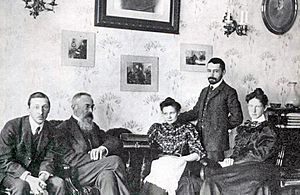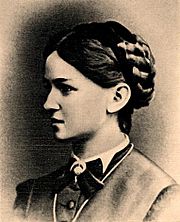Nadezhda Rimskaya-Korsakova facts for kids
Nadezhda Nikolayevna Rimskaya-Korsakova (born Purgold) was a talented Russian pianist and composer. She was also the wife of the famous composer Nikolai Rimsky-Korsakov. Born on October 31, 1848, she lived until May 24, 1919. Her son, Andrey Rimsky-Korsakov, became a well-known expert in the study of music.
Contents
Her Life Story
Early Years and Music Studies
Nadezhda Nikolayevna Purgold was born in St. Petersburg, Russia. She was the youngest of three daughters. She started playing the piano when she was nine years old. She continued her piano lessons at the St. Petersburg Conservatory with Anton Gerke. She also studied music theory there with Nikolai Zaremba. Later, she learned about composing and arranging music from Nikolai Rimsky-Korsakov himself.
In the 1860s and 1870s, Nadezhda often played piano at musical gatherings. These events took place at the home of Alexander Dargomyzhsky. She became good friends with Dargomyzhsky, Modest Mussorgsky, and Alexander Borodin. Mussorgsky was very fond of Nadezhda and her sister Alexandra. He even called Nadezhda "our darling orchestra" because of her amazing piano skills. She also played music by Mily Balakirev and other members of a famous group of composers called "The Five." She performed parts of Mussorgsky's operas, Marriage and Boris Godunov, and Rimsky-Korsakov's The Maid of Pskov.
Marriage to a Famous Composer
Nadezhda met Nikolai Rimsky-Korsakov at Dargomyzhsky's home in the spring of 1868. Soon after they met, he wrote a song and dedicated it to her. He started visiting her often, both in St. Petersburg and at her family's summer home. He proposed to her in December 1871, and they married in July 1872. Mussorgsky was Rimsky-Korsakov's best man at the wedding. Nadezhda and Nikolai had seven children together.
Nadezhda became more than just a wife; she was also her husband's musical partner. She was like Clara Schumann, who supported her husband Robert in his music. Nadezhda was very skilled in music and had better training than her husband when they married. She was a good and honest critic of his work. Her influence on his music was so strong that some friends wondered if she was changing his style too much.
Even though she mostly stopped composing after her marriage, she greatly influenced her husband's first three operas. She traveled with him, attended rehearsals, and helped check and arrange his music and the music of others. Nikolai Rimsky-Korsakov once wrote that a part of his opera The Maid of Pskov belonged to "a no-good girl whom I love very, very much." This showed how much he valued her input.
Nadezhda loved the stories of Nikolai Gogol. This love for Gogol's work influenced both her husband and his friends. On the day they got engaged, she and Rimsky-Korsakov read Gogol's story "May Night" together. She then told him he should write an opera based on it. Later, she suggested "The Fair at Sorochyntsi" to Mussorgsky, which he later used for an opera.
Nadezhda was also very important in the Rimsky-Korsakovs' social life. She often played piano and performed at their home gatherings. At one of these events, Pyotr Ilyich Tchaikovsky played the end of his Little Russian Symphony. After hearing it, Nadezhda was so moved that she asked him to let her arrange it for two pianos.
A Strong and Loyal Voice

Nadezhda was known for speaking her mind. She was fiercely loyal to her husband. For example, when Anton Rubinstein became the director of the St. Petersburg Conservatory again in 1887, he started replacing Russian teachers with foreign ones. A friend, Stasov, was upset and wrote to Rimsky-Korsakov about it.
Nadezhda decided to reply to Stasov's letter herself. She told him that he should learn the facts before writing. She also said that her husband did not need anyone's advice to act honorably. This showed her strong character and how much she stood up for her husband.
After Rimsky-Korsakov passed away in 1908, Nadezhda took charge of his musical and written works. This was a big job. She edited and published his autobiography, My Musical Life, and collections of his articles, notes, and letters. She spent the rest of her life making sure her husband's legacy was remembered. She even protested when Sergei Diaghilev used music from her husband's works, Scheherazade and The Golden Cockerel, for ballets.
Nadezhda died from smallpox in St. Petersburg (which was then called Petrograd) at the age of 70. After her death, her son Andrei continued her work. He wrote a long study about his father's life and music.
Her Music
Musical Arrangements
Alexander Dargomyzhsky taught Nadezhda how to simplify orchestral music for piano. She was very good at this skill. She made piano arrangements for four hands (meaning two people playing on one piano) of works by Dargomyzhsky, Rimsky-Korsakov, Tchaikovsky, Borodin, and Glazunov. She also arranged the vocal scores for Rimsky-Korsakov's operas The Maid of Pskov and The Noblewoman Vera Sheloga. She helped arrange Borodin's opera Prince Igor with Glazunov and her husband.
Original Compositions
Nadezhda also wrote her own music. We still have her original handwritten music for a symphonic piece based on Gogol's story, "The Bewitched Place." She also wrote an opera called Midsummer Night for piano and voice, along with other piano pieces and songs. She finished "The Bewitched Place" just before her marriage and arranged it for orchestra the next year. She stopped composing after marrying Rimsky-Korsakov. This might have been because she compared her works to his, but it was also likely due to her family responsibilities.
 | Bessie Coleman |
 | Spann Watson |
 | Jill E. Brown |
 | Sherman W. White |


